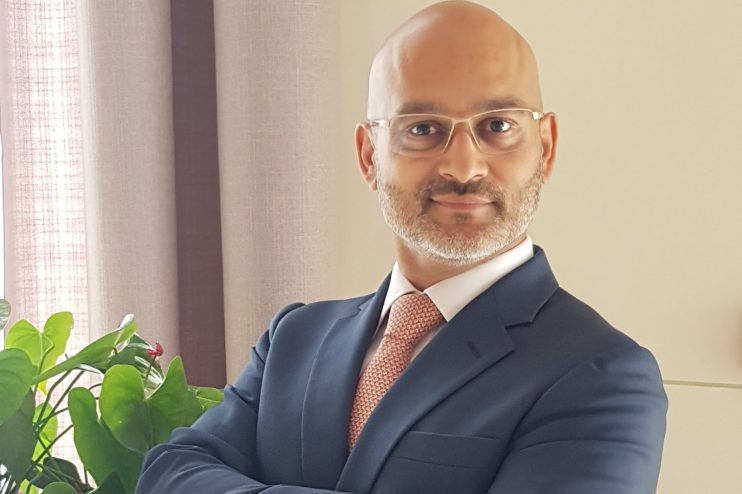A leap of faith into the ethics of a DeFi world

Khalid Howladar is the Chairman of MRHB DeFi, the world’s first ethical and faith-based decentralised finance platform. In addition, he is a Senior Managing Director and Head of Credit & Sukuk for RJ Fleming & Co – the boutique merchant banking advisory of the Fleming Family.
Journalist Jillian Godsil caught up with him to find out how he got into crypto…
How did your career take you to this particular junction of regular finance and decentralised finance?
Up until five years ago it was pretty straightforward, two decades of blue-chip institutional roles – EM Risk at Credit Suisse in London and then a series of leadership roles in credit markets at Moody’s in London & Dubai culminating in the Global Head of Islamic Finance & Middle East banks.
Then things dramatically changed as I took the plunge into entrepreneurship by setting up my own ratings and risk consulting firm – Acreditus. It’s at this time I also started actively investing in startups and developed a ‘portfolio career’.
My institutional advisory practice became part of R.J. Fleming & Co, a reincarnation of the 150yr old British merchant bank but my start-up passion took me from being a passive investor to more of a venture builder. Through Acreditus Partners I’ve now invested in 13 start-ups – with innovation and impact being a broad theme.
My eclectic portfolio covers businesses ranging from EV Crypto and Halal Defi to Psychedelic Depression biotech and foodtech. I often take active advisor or Board roles in many firms focused on governance strategy, risk and helping institutionalise the business and take it to the next level.
How did you make the move across into crypto – what did you read and what influenced you?
The Bitcoin Standard / Saifedean Ammous. I also had a ringside expert seat at the Global Financial Crisis while working at Moody’s. My expert knowledge of debt markets and banks, coupled with (i) the post crisis central bank responses of money printing, (ii) the ongoing damage to society and (iii) rising inequality got me interested in cryptocurrencies as a solution to the government abuse of money. So many different complex ideas were brought together clearly in this book and since then I’ve made it one of my core objectives to support initiatives and start-ups that have some kind of cryptoasset or decentralised impact theme.
Tell me about your current crypto project and what makes it different?
MRHB DeFi – a global gamechanger aiming for one billion+ faith-based, unbanked and crypto-cautious communities excluded from the current growth and wealth opportunities of the cryptoverse.
Unlike most (if not all) other DeFi projects we put ethics, faith, community and governance at the heart of the platform. We are building an entire ecosystem of products that excludes all forms of debt and lending to focus on peer-to-peer trading and investment opportunities. We hope this crypto ‘safe-space’ will change the world of DeFi although true decentralisation for the masses will be tough until we can come up with effective solutions for anonymised/decentralised AML/KYC etc. These issues need to be tackled if we are to go mainstream and engage the four billion adults who are currently excluded or avoid cryptoassets.
What is your number one criteria for success in business?
I have two – meritocracy and teamwork strength,
If a fellow business leader would ask you for advice about whether to bootstrap or to look for VC capital, how would you help them weigh the pros and cons of that decision?
I would recommend bootstrapping until at least the first value inflection point Then – ideally when you are in need of growth capital – find a VC with a strong track history in your space coupled with a good personality/culture fit. Better to have a small piece of a big pie vs big piece of a small one – but remember for them you are but one of a portfolio of high ‘failure’ rate firms so they are comfortable to push for more rapid high risk growth, whereas for you it’s your only firm – best be a bit more cautious.
What measure do you use to determine the value of a company? What advice would you give to other leaders about how to get an optimal evaluation of their business?
Pre-revenue, recent peer comps are probably the best metric to apply – especially given the impact of qualitative and market factors that are difficult to model. Once more established then cashflow modelling, market sizing etc become more meaningful to any valuation. Beware of false precision and always run multiple scenarios with stress variations in your key risk variables and business to understand a full spectrum of outcomes.
What are the most common finance mistakes you have seen other businesses make? What should one keep in mind to avoid that?
Running out of cash. Ensure early team are aligned with equity incentives AFTER performance KPIs is either known or demonstrated. Beware of ‘expensive’ individuals who have not yet to demonstrate value – mutual probation periods are recommended to test for compatible human capital.